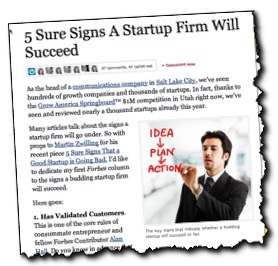This morning I can’t resist writing about Vivek Wadhwa’s Winner’s Curse post on TechCrunch last weekend. Odd combination: it’s interesting, thoughtful, well-written, about a subject near and dear to my heart, and, at least in the title, wrong.
In the full title of his fascinating post, he says losing a business school business plan competition is better than winning.  That title assertion is my only real objection. He makes several great points explaining how business plan contests can be good for people, and how the winner isn’t necessarily the best business, and how these contests should not be confused with reality. No argument from me on any of those points. However, even if it’s not much difference, even if it means very little, winning is still better than losing.
That title assertion is my only real objection. He makes several great points explaining how business plan contests can be good for people, and how the winner isn’t necessarily the best business, and how these contests should not be confused with reality. No argument from me on any of those points. However, even if it’s not much difference, even if it means very little, winning is still better than losing.
Maybe it’s just a blog post title thing: surprise gets better traffic. Contrarian gets better traffic.
I’ve frequently been a judge at business school business plan contests (Moot Corp, Rice University, University of Oregon, University of Notre Dame, and others) and some non-school contests too (Forbes, for example). I think they’re great fun, great experience, a real educational opportunity, and pretty much right in line with his summary on that post:
This is not to say that the contests are bad. Instead, they educate students in entrepreneurship and motivate them to come up with interesting ideas. But for all of you out there who think a biz plan victory is a ticket to the big time, think again. And for all the engineering students who think any outcome but victory is a waste of time, you also need to think again.
He goes on to say that losing is better because winning generates praise too early in the business life cycle:
I submit that losing in a business plan contest is actually more beneficial than winning. There is a growing body of research that children who are praised too early and too easily end up under-performing peers who are not praised but are told, in constructive terms, they can do better.
I don’t buy that argument. I’ve been judging these contests for 12 years now, and I see a steady progression towards more and more real businesses, out there in the real world, rather than imaginary or hypothetical business. And in that case, as soon as the awards ceremony is over, the winners are right back out there in the real world, fighting the real battles on the front lines, with no time to bask in any glow. It’s reality for all, winners as well as runners-up and also-rans and losers.
So agreed, winning doesn’t mean much; but it’s not bad.
I’ve seen some really good winners in these contests. Look for example at Klymit, or Qcue, just to name a couple. These are companies which won business plan contests and continued growing. Wadhwa says “not a single home-run has emerged from this now-omnipresent practice.” But hey, that’s placing the bar pretty high. We’re talking about a few dozen such contests per year. Is there nothing between home run and failure?
By the way, this is the second really good post by Vivek Wadhwa about entrepreneurship on TechCrunch in barely a week or so. I posted here on the first one. Good stuff. His work is a nice addition to TechCrunch.
(Image credit: Aleksandr Kurganov/Shutterstock)



 I disagree. I don’t think strategic planning assumes that the world is stable and predictable.
I disagree. I don’t think strategic planning assumes that the world is stable and predictable. 
 That title assertion is my only real objection. He makes several great points explaining how business plan contests can be good for people, and how the winner isn’t necessarily the best business, and how these contests should not be confused with reality. No argument from me on any of those points. However, even if it’s not much difference, even if it means very little, winning is still better than losing.
That title assertion is my only real objection. He makes several great points explaining how business plan contests can be good for people, and how the winner isn’t necessarily the best business, and how these contests should not be confused with reality. No argument from me on any of those points. However, even if it’s not much difference, even if it means very little, winning is still better than losing.

You must be logged in to post a comment.